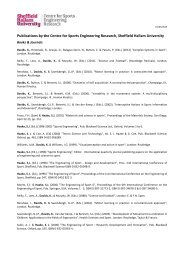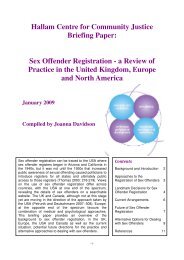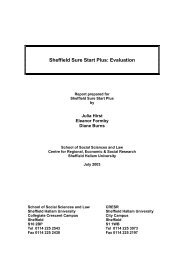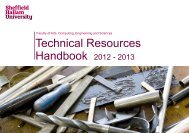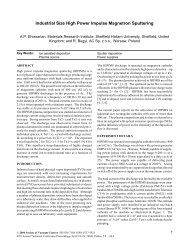The exercise of judicial discretion in rent arrears cases - Sheffield ...
The exercise of judicial discretion in rent arrears cases - Sheffield ...
The exercise of judicial discretion in rent arrears cases - Sheffield ...
You also want an ePaper? Increase the reach of your titles
YUMPU automatically turns print PDFs into web optimized ePapers that Google loves.
Chapter 1: Introduction<br />
<strong>The</strong> nature <strong>of</strong> <strong>discretion</strong><br />
“In modern society the law regulates the complex behaviour <strong>of</strong> millions <strong>of</strong> people. To<br />
do this efficiently – to do this at all – broadly applicable rules must be used. Yes<br />
such rules are bound to be <strong>in</strong>complete, to be ambiguous, to fail <strong>in</strong> some <strong>cases</strong>, to be<br />
unfair <strong>in</strong> others. Some <strong>of</strong> the drawbacks <strong>of</strong> rules can be m<strong>in</strong>imised by giv<strong>in</strong>g<br />
<strong>discretion</strong> to the adm<strong>in</strong>istrators and judges who apply them. Yet do<strong>in</strong>g so dilutes the<br />
advantages <strong>of</strong> rules and creates the risk that <strong>discretion</strong> may be abused”<br />
(Schneider, 1992).<br />
This study is concerned with one particular area <strong>of</strong> social life where judges have been given<br />
a clear <strong>discretion</strong> – that is whether to evict a tenant <strong>of</strong> a social landlord (by which we mean<br />
local authority or hous<strong>in</strong>g association) from their home for <strong>rent</strong> <strong>arrears</strong>. <strong>The</strong> law could<br />
operate <strong>in</strong> two ways – it could give <strong>discretion</strong> to the adm<strong>in</strong>istrators (the landlords) or to the<br />
judges. It could also create a rule-bound structure or leave a much more open <strong>discretion</strong> <strong>in</strong><br />
order to take <strong>in</strong>to account the myriad <strong>of</strong> circumstances which may account for why <strong>arrears</strong><br />
have arisen, what the tenant may be will<strong>in</strong>g or able to do about them, and what order the<br />
landlord is seek<strong>in</strong>g.<br />
As the legal structure set out <strong>in</strong> Chapter 2 <strong>in</strong>dicates a broad <strong>discretion</strong> is given to judges <strong>in</strong><br />
the type <strong>of</strong> <strong>cases</strong> we are consider<strong>in</strong>g, and this study seeks to exam<strong>in</strong>e how judges <strong>exercise</strong><br />
this <strong>discretion</strong>.<br />
Aims <strong>of</strong> the research<br />
<strong>The</strong> focus <strong>of</strong> this research is on claims for possession for <strong>rent</strong> <strong>arrears</strong>. It may be noted that<br />
<strong>rent</strong> <strong>arrears</strong> are by far the most common reason for social landlords to seek possession, and<br />
that these make up over 95% <strong>of</strong> actions entered (Pawson et al, 2005). We refer to these<br />
actions throughout the report as hous<strong>in</strong>g possession <strong>cases</strong>, <strong>in</strong> which the landlord is the<br />
claimant and the tenant is the defendant.<br />
<strong>The</strong> <strong>exercise</strong> <strong>of</strong> <strong>judicial</strong> <strong>discretion</strong>, by which judges decide whether it is reasonable to grant<br />
possession and if so whether to suspend it on terms, has become an area <strong>of</strong> concern for<br />
policy makers for two reasons. First there has been an <strong>in</strong>creas<strong>in</strong>g use <strong>of</strong> the courts by social<br />
landlords, which appears to have been accompanied by an actual rise <strong>in</strong> evictions (Pawson<br />
et al, 2005). Secondly, the Law Commission has been conduct<strong>in</strong>g a comprehensive review<br />
<strong>of</strong> the law relat<strong>in</strong>g to the security and status <strong>of</strong> tenants, which has <strong>in</strong>evitably brought a focus<br />
1



